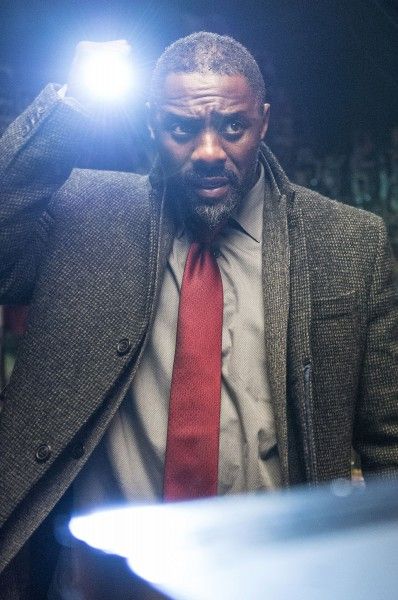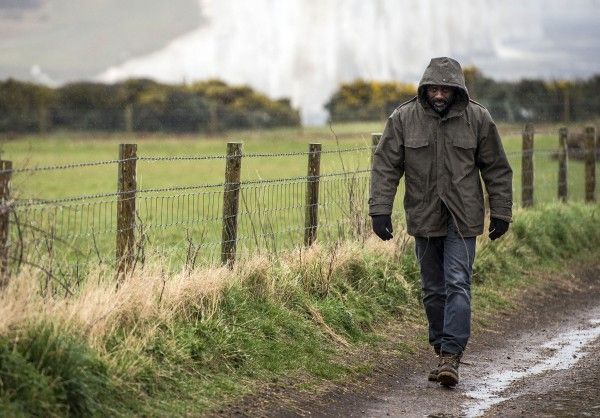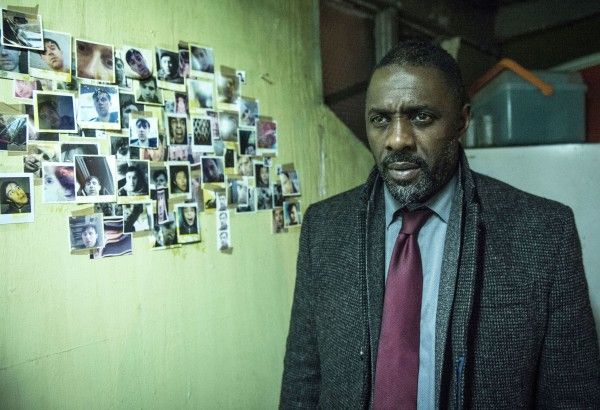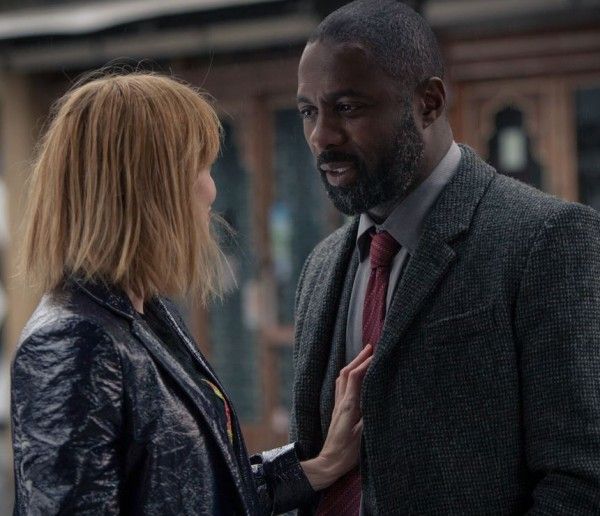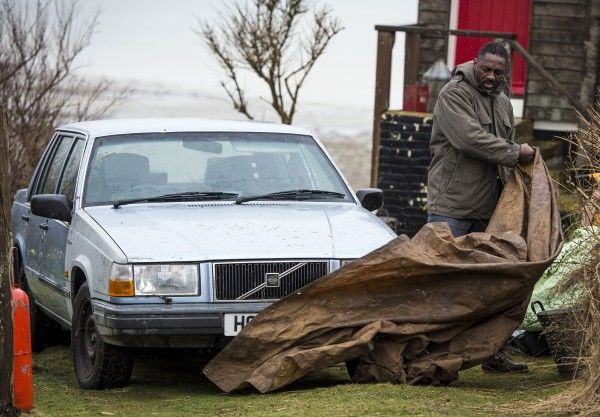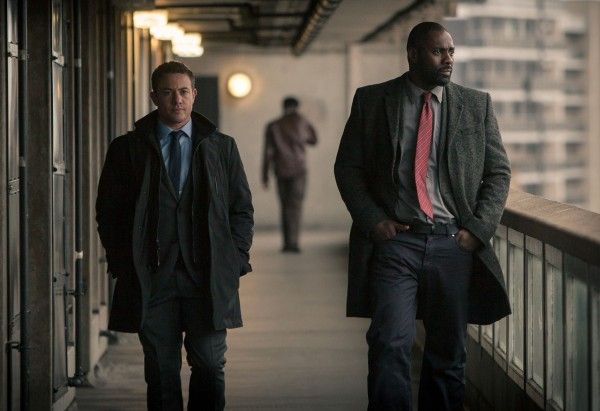The undeniably gripping psychological thriller Luther is back on BBC America for a one-night special event, with Idris Elba returning to his iconic role as self-destructive, near-genius Detective Chief Inspector John Luther. He’s a man on the edge of law enforcement who may never be able to walk away from capturing the tormented psychopaths that lurk the streets of London, so when the terrifyingly complex case of a cannibalistic serial killer comes his way, it not only pulls him out of seclusion but pushes him to a deeper and darker place than he’s ever been.
During a Q&A after a New York City screening of the latest two hours of Luther, held at the beginning of December, actor Idris Elba talked about doing such a small number of episodes of the series, how collaborative the development process with show creator Neil Cross is, whether there could ever be a big screen movie version, his favorite villain, working on an a music album based around the idea of the show, being a bad-ass, and why this is a character that he could see himself playing indefinitely. Be aware that there are some spoilers.
Question: The amount of episodes you've done has varied with each season. Has there been any conversation about not giving fans enough?
IDRIS ELBA: We have a really well-educated, patient audience that haven’t actually really paid attention to the trappings of episodic. They've thought outside the box. With Luther, we’ve done six episodes, four episodes, and now two or one. The idea is that we’ve been allowed to, by the audience, just break down Luther, in any which way we want to. Neil Cross, the writer who is literally the brains behind this, has decided, "How about we just re-educate our audience to how they digest TV and a character, in a way that’s just a little bit more exciting?" If you have to wait two years for a show, and then suddenly they come out with two episodes, in our opinion, that’s quite exciting.
When you and Neil Cross were talking about where to take Luther next, before telling this two-hour story, were there things that you told him that you specifically wanted to do, investigate, or look into?
ELBA: Yeah, I’ve been quite vocal about the genesis of Luther. It doesn’t quite fit with the 13 to 23 episode arc you might get on generic American TV, or English TV that has six episodes. Luther is too dark and too violent to be able to sustain over that sort of time. And as an actor, I want to do it forever and there’s no way I could do it for 23 episodes. There’s no way. So, the idea is to reinvent the audience’s anticipation of it. I’ve been vocal about the idea of doing Luther as a film on the big screen with a bigger story and longer arc. This represents the very, very early pillar for the film’s true spirit.
Are you saying that, if enough people watch the special, that could maybe serve as the impetus for creating a big screen movie?
ELBA: It's not if enough people watch it. The idea is that we’ve obviously distilled it, via the season, to a place where we feel like we can tell the Luther story in a succinct package. This represents the TV version of that. I actually think that we can do a film version of it. In truth, candidly, everyone keeps talking about Bond, and all that nonsense, but the truth is, Luther is Bond. He's a central character that gets himself in a lot of shit. There's no re-invention of the wheel there.
You just said you wouldn’t be able to do 23 episodes. Is that because it’s so dark?
ELBA: Yeah, absolutely. It's a really dark show. Neil Cross lives in New Zealand and he writes from his computer. There’s a window to the left, and from the window, he can see a huge, beautiful, mountainous landscape, from which he conjures up these really weird people-eating characters.
Do you have a favorite villain from all of the seasons?
ELBA: Alice.
Alice is a very big presence, even though we don’t see Ruth Wilson. Were you at all trepidatious about taking the Luther story forward without her?
ELBA: Without a doubt. [The audience loves] Alice, and quite rightly so. She’s very much a part of the fabric. In The Wire, Stringer and Avon were designed for Season 1, and Season 1 only. Anyone from HBO that was involved would know that. The truth is, with Alice and Luther, it’s a very similar scenario. Neil didn’t really write Alice to be a part of the whole aesthetic of the show. So, come Season 4, everyone is like, "Where’s Alice?," but he didn’t really design the show to be around Alice. It's a great thing that the audience wants her to be there, but she isn’t part of the show and it really is a bit scary to introduce a new season of Luther without her. But ultimately, her presence is there.
Because of the darkness of the show, is there anything you do, after the end of the day, to just rid yourself of that? Is there a palate cleanser for you?
ELBA: No. While I’m working on Luther, I decide not to palate cleanse, at the end of the night, because there’s no point. Although this is fiction, we design the show to be as visceral and as engaging as it can be. Of course, it’s a very big story, slightly embellished, but the truth of the matter is, a murder detective has to see this on a daily basis and its tough work, no doubt. So, for me as an actor, even though I’m acting, I finish at 7 am, get home by 8 am and then get back to work at 4 am, to do the whole thing again. While I’m at it, there’s no palate cleansing, except for maybe a little bit of porn. Just joking. But the truth is, when you’re playing Luther, you’ve just gotta keep going. There’s no point in trying to fix it. I took on Luther four years ago. In my personal life, I was down. It was a very tough time, and I took Luther because it brought me back to England. I needed England, at that time, I needed an English character, and I needed to work. Luther was that guy. I had no connection to Neil and no connection to the BBC. The last time I was on TV was The Wire. So, playing Luther was a real palate cleanser for me, at that time. I just needed to use the character to release a lot of who I am, as a person, to get it out.
How did you recover from doing something like Beasts of No Nation?
ELBA: Candidly, I recovered because I have a son who is 20 months old. His name is Winston, and he’s the love of my life. He was born April 17th, and I started work on April 22nd, literally after he was born. I stayed with him about seven days, and then I went to work. So, I recovered from that film by going home to him. That’s the truth. There’s nothing else to it.
With London really being another character in the show, could you ever see Luther transplanted to another place?
ELBA: Similarly to the way Bond, and every film franchise character, uses a city to be the backdrop, I think what we do with Luther and London is transferrable to other cities. There’s no doubt. In the way that my character gets away with wearing the same clothes, every single episode, you buy into that. So, if you buy into the idea that he falls into any city wearing the same clothes, but the city still gets the same kind of exposure that London gets, it will work.
You’re working on an album called Murdah Loves John, based around the idea of the show. How did that come about?
ELBA: I thought it sounded cool. Murdah Loves John is an extension of my massive fantasy to be a musician. When I did Mandela, I made an album for Mandela, called Me Mandela, and Murdah Loves John is the second installation of my music. I’m trying to give my fans, and people that love film and music, a very interesting perspective into both worlds. Me Mandela was me talking about my dad, my loss of my dad, my loss of Mandela, and an exploration of being an actor playing Nelson Mandela. Murdah Loves John is eight tracks. It’s not really an album, but it’s an album that really explores Luther, explores being a murder detective, and explores someone that is a murderer that is in love with a detective. That’s what the album is about. I wanted to give people that love what I do, as an actor, and that love music, a very specific niche market. Anyone that’s really interested in that hybrid between someone that loves music and this film, it is an interesting entry point.
What's the vibe and sound?
ELBA: I designed all the tracks so that you could watch every episode of Luther, turn down the music, the sound and the acting, and just watch it with the music and still get the vibe. It would feel like six music videos, all at once. The music is very much designed around the aesthetic of the show. It's a great album, ladies and gentlemen.
When can we listen to it?
ELBA: There is a pre-order on iTunes.
Your fans on Twitter want to know, how did you get to be such a bad-ass?
ELBA: You would have to define bad-ass. My definition of bad-ass is that I’m a force of nature and true spirit. I’m self-admitting that, and it sounds vain to say that, but I am. I come from an era, in my world, where you just had to define yourself as who you are and what you do. I happen to be an actor. I happen to be someone that loves to act, that also likes music, that also likes to speak, and that also has an opinion. So, as far as being a bad-ass is concerned, I really don’t understand it. The truth is, I was never born with a spoon in my mouth, but I realized that, with my talent, I can actually influence. I can say some shit and put something out there. When you come from an under-privileged background, oftentimes, you feel a little overwhelmed by your education or your lack of. In my growing up, my mom and dad had a good education, but weren't scholars. They were achievers. They came from Africa, moved to England, had a child, had a job and had a home. I’m a product of my mom and dad’s journey from Africa to here. If that makes me a bad-ass now, by way of the fact that my mom and dad encouraged their child that landed in England to go ahead and live their dreams, be an actor, be vocal, be stylish, be musical, be whatever, then great. Thank you very much. I’ll take that. But being able to define that, I don’t know how to do that. I really don’t. I think everyone understands that there are elements that we can all relate to. What I’ve done is just put it all together. I don’t do all of it good, but I do all of it, and that’s important.
Neil Cross has said that he will write Luther until Luther is old and grey. Is it the same for you, as the actor playing him?
ELBA: Luther is one of those characters that I think we could just keep going with. We're very fortunate to have a character that falls into that very weird space. In this world that we live in right now, we’re also looking for someone to speak up and go, "What the fuck?!," and Luther is that guy. I like that about Luther. To have someone that just goes, "Don’t worry about it, guys, I’m gonna put on my grey coat and my tie and I’ll take care of it," let's have that. If I can play that part forever, I'll do it.
Do you have a director in mind that would be perfect to make a big screen Luther film?
ELBA: No, but honestly, I think Sam Miller, who’s done the majority of the Luther franchise, as a TV show, would be my first director. He also did No Good Deed with me, which received mixed reviews. Regardless, I think he’s an amazing director, and I think that he would be our first choice to make the movie, for sure.
If you keep playing Luther indefinitely, do you worry about being too identified with him?
ELBA: No, I don’t worry about being attached to Luther forever because, having had the experience of Stringer Bell, people do know how to reprogram their minds about you, as an actor. Because I’ve been in so many different types of roles, people really don’t expect one thing. I definitely read roles thinking, “Have I done this before?”
Knowing the type of men they both are, do you think that Stringer Bell and John Luther would be friends, or are they too different?
ELBA: Playing Stringer Bell was at the beginning of the second half of my career. Luther came at the point where I was really tired of making shit movies, and I got a really great television moment. That’s the truth. That's the difference. I think Stringer Bell, the character, was way more stylistic to play. I could just adhere to the style of the show. We were talking about an underbelly of America in The Wire, and we were talking about drug dealers, at a time where, in 2001, there was an aesthetic of black men looking cool. Stringer Bell came really natural to me because I had lots of influences to draw on. Cut to Luther, eight years later, and it’s very different. He's a very different guy. I was the first black detective ever to head a show on BBC. I just didn’t know that, at the time. In The Wire, I was character from David Simon’s very, very calculated point of view and experience of Baltimore. I played that guy. Luther was very much different. Luther is, without a doubt, more revolutionary because the BBC decided that they were going to go a different way in their drama. As an actor, the most difficult character to play is John Luther because I walk onto the set and I don’t have to do an accent. I just show up and put a jacket on. We’re shooting in the areas that I literally grew up in. So, there's a lot of difference between the two.
Luther airs on BBC America on December 17th, and on BBC One on December 15th.


